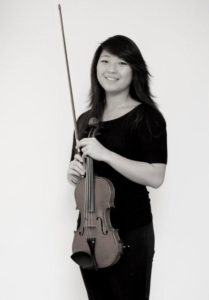A Violin Virtuoso in the Making
Elise Wignall’s Music Comes From Her Heart
By Colleen Gundlach
When Elise Wignall talks about music and her violin, her eyes light up. When she plays her violin, her listeners’ eyes light up. The music seems to come from her soul and is flawlessly played. This high school junior first became interested in the violin at the age of four, and [E1]was enrolled in the University of Hartford’s Hartt School of Music Community Division at the tender age of five. Her journey began on the other side of the world, in South Korea, where, at three and a half months old, she was adopted by Peter and Tina Wignall of Norfolk. When she developed her intense interest in the violin, her parents chose the Suzuki method of training. Her mother, a flute teacher, was initially skeptical about this method, but was soon learning alongside her talented daughter. The Suzuki Method was devised by Shinichi Suzuki, an educator born in 1898, who devoted his life to the development of this curriculum. Noting how easily young children learn their native language, Suzuki felt that they could be taught music in much the same manner. As children learn a language by repetition long before they learn to read, Suzuki began teaching music by having children listen to a repertoire that they eventually memorized by ear. Only then did he begin to teach his students to read music. It was in this manner that Wignall sharpened her talent. Six days each week she practiced, from kindergarten through eighth grade. On the seventh day, Saturday, she and her family would commute to Hartford for her violin classes. “In order to get anywhere, you have to practice,” she said. If you don’t practice, there’s no forward motion. One day can make a big difference.” When she was ready to move from the Suzuki method on to more traditional training in eighth grade, she became a student of Brunhilda Myftaraj, an Albanian-born virtuoso, who also began to play violin as a young child. Under Myftaraj’s tutelage, Wignall has blossomed into a true violinist. During her time as a student at Botelle School, she participated in the string instrument program. While still a sixth grader, Wignall auditioned for, and won, a seat in the orchestra of the Connecticut Music Educators Association’s festivals, and has done so every year since. Additionally, the Northern Region High School Festivals are held once a year, and students from all over this part of the state compete. The top ten percent are eligible to audition for the All-State Festival. This is a recognition that few students receive even as high school seniors, but Wignall won a violinist seat in the All-State festival in 2008, her sophomore year. She is looking forward to auditioning again this year, on February 7. While her love of the violin is a big part of her life, Wignall is also a very active athlete, representing Regional 7 on the swim team, spending some time six days a week in the YMCA pool. She is also a member of the track and field team. Surprisingly, Wignall has no interest in being a music major in college. “It’s too risky to major in the performing arts,” she remarked. She is planning instead to take pre-med courses and work toward being a physician. An all honors student, she was recently inducted into the National Honor Society, a group of students with at least a 3.2 grade point average who are selected for their leadership and community service. To round out her capabilities, she is also a Sunday School teacher at Church of Christ, Norfolk, plays oboe in the Regional 7 band, and is a volunteer at a local hospital. When asked which one of her concerts was her favorite, Wignall smiles. “Last year’s All-State, without a doubt,” she said. With Dr. Glenn Block as guest conductor, the group played Rachmaninoff’s Symphony #2 in E Minor, Opus 27. “Everyone was amazing at their instruments,” Wignall reminisced. “The symphony in itself was spectacular. We completely nailed it.”

